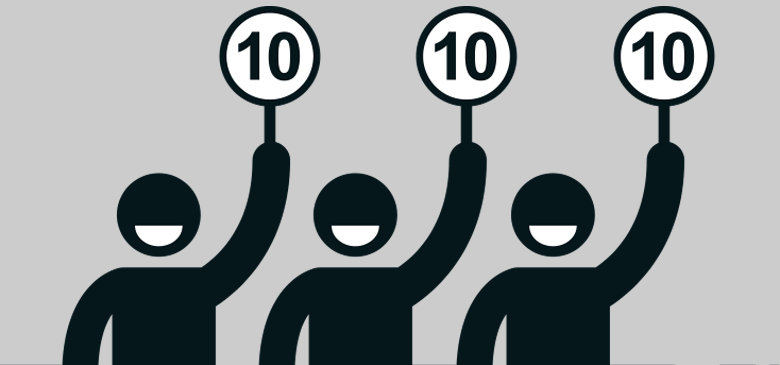Tuesday's Rule #10
Perfection
Week 10! We’ve made it in to double figures.
The number 10 is associated with perfection.
Some of the most memorable achievements in history have been immortalised through the number 10.
At the Montreal Olympics in 1976, Nadia Comaneci "broke the scoreboards" by becoming the first gymnast to be awarded a perfect 10. She was aged just 14.
This is immortalised as a classic, all-time Olympic moment and a feat that was thought to be impossible before Nadia.
In fact it was so implausible that the scoreboards were not configured to show it, and Nadia's score was presented as a 1.0.
Elsewhere in sports, the French magazine L'Equipe is famous for its performance ratings for players in big football matches. They are notoriously harsh; only 14 players have ever been awarded a 10 rating in the magazine's history. A score reserved for a truly flawless performance.
And for those not into sports, anyone who watches Strictly Come Dancing, a show famous for judges awarding dancers scores out of 10 for their dance routines, will know how special it is for a dance to be awarded 10s across the board.
The dictionary definition of perfection is:
Having all the required or desirable elements, qualities, or characteristics; as good as it is possible to be
On the surface, perfection sounds like something we should all strive and work for, something worth pursuing.
But there are times when perfection and the pursuit of perfection can be harmful.
A relatively well-known saying is that "perfect is the enemy of good". Making a small tweak, this week's rule is:
Don’t Let Perfection Be The Enemy Of Progress
I find myself saying this at work. When working with numbers, more accuracy is always possible, but sometimes, it is important to know what is "good enough" to move forward and make decisions.
The Pareto principle (80/20 rule) explains this. It often takes 20% of the time to complete 80% of a task, while completing the last 20% takes 80% of the effort.
Achieving perfection may be possible, but more effort results in diminishing returns, making further improvements increasingly inefficient.
This isn't to say that quality isn't important. It really is. However, it is just as important to recognise when good enough is good enough and press ahead.
The applications to this particular aspect of the rule are very broad, and could just as easily apply to my warm-up before a round of golf on a Sunday as it could to my day job.
But there's more to this rule than the diminishing returns found from worrying about that final 20%.
When starting something new, the chances of achieving perfection are almost exactly zero. But it feels like a huge reason that people (myself included) are hesitant to even try.
As author Ryan Holiday captures in his book, "Discipline is Destiny":
Perfection is often misspelled as ‘procrastination’
Here are some real-life examples of where perfectionism may get in the way of progress:
Worrying that you'll be weak in the gym or struggle with even a short run, so deciding not to exercise at all
Being concerned that the stock market is too high and overdue a correction, delaying investing only to see the market continue to grow
Thinking your blog/short story is still not quite ready, so leaving it on your laptop for only you to see
The final one has been a particular battle for me in recent years as I've sought to be more open with my writing.
But I've quickly learned that you can’t be both prolific and perfect.
And the only way to improve is to be consistent.
And the only way to be consistent is to start.
And the only way to start is to be willing to be imperfect.
There are almost no examples of anyone with any real success that was perfect immediately.
Even 14-year-old Nadia Comaneci only achieved perfection through years of iteration and hard work.
Oh… and not to mention, the first ever perfect 10 she achieved wasn't even rewarded with a Gold medal.
She and her Romanian teammates were beaten into second place by the more consistent, stronger team unit from the Soviet Union, and her exploits were only enough to earn her Silver. (She did go on to achieve several Golds in her career).
Perfection is a nice idea, but it is typically unobtainable—and sometimes not even enough to win.
So, instead of seeking perfection, seek to make progress.
It’s more realistic, and an awful lot easier.


